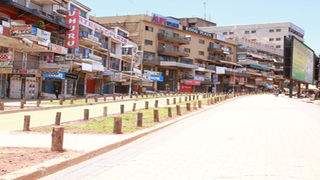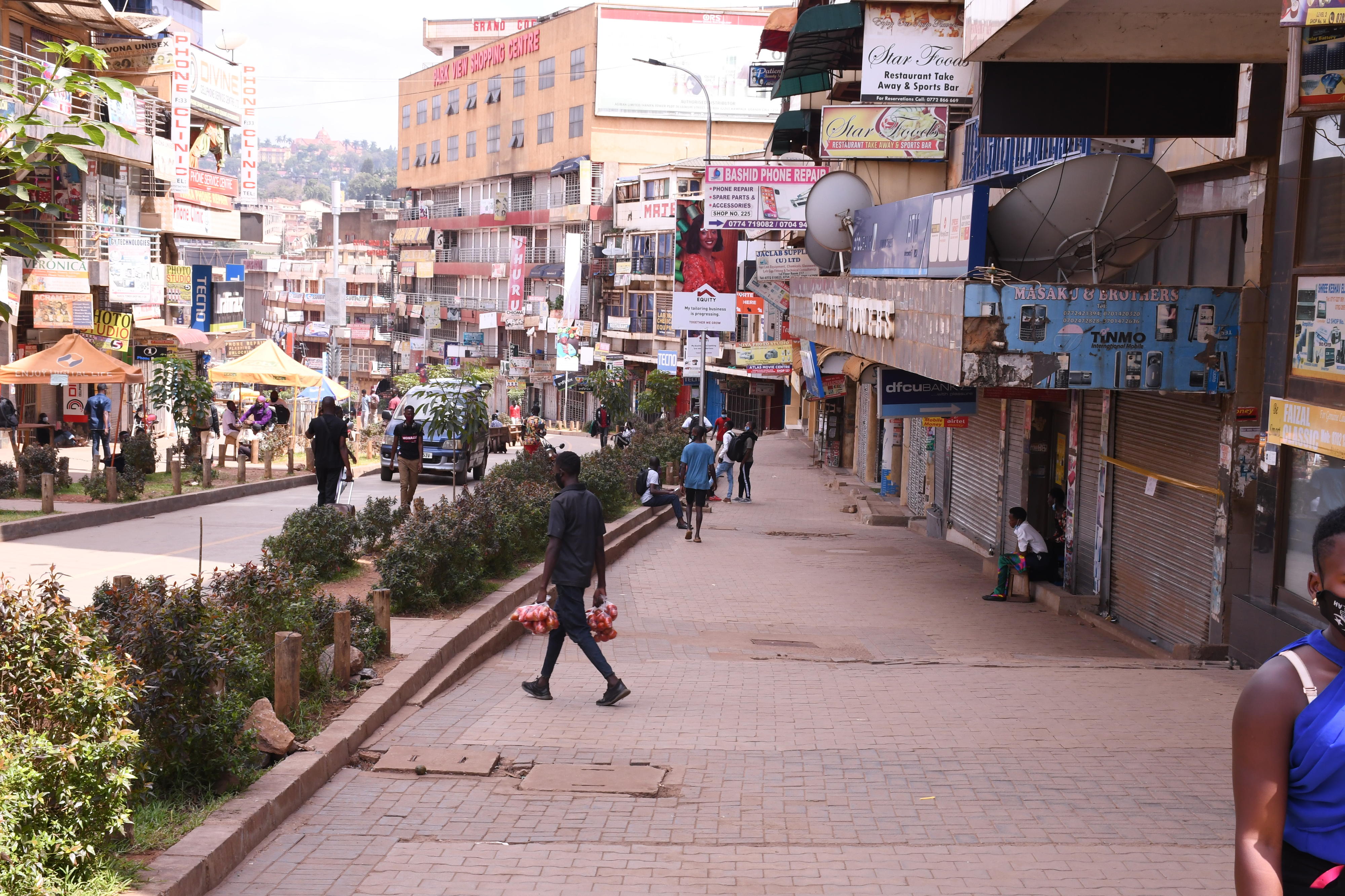
Closed shops in Kampala during the lockdown in 2020. A study by EPRC showed that 87 percent of the enterprises faced challenges accessing inputs during the lockdown. PHOTO/MICHAEL KAKUMIRIZI
|Prosper
Prime
Two years later: Covid-19’s impact on businesses lingers on
What you need to know:
Small and medium sized businesses suffered substantial impact due to their informality, reliance on physical interactions for inputs and markets, and high vulnerability.
The Covid-19 pandemic’s effects and the resultant containment measures are still taking a huge toll on businesses, years after full reopening of the economy, Prosper Magazine can reveal.
While the world seemed to have moved on, the effect of the pandemic have not gone away. The economy is still far from normal as prices are rising at their fastest pace in decades.
According to Prosper Magazine investigations, corroborated by the latest study commissioned by the Economic Policy Research Centre (EPRC) in December, most Micro, Small and Medium Enterprises (MSMEs) are struggling to cope with the effects of the pandemic and its strict containment measures.
For example, enforcement of curfews, movement restrictions and generally putting huge part of the economy under lock and key for about two years has since left most MSMEs badly bleeding - in some instances, folding for good.
Findings from surveyed MSMEs that were tracked between 2020 and 2022 at a time when Covid-19 and measures to contain its spread were enforced by Government, reveals that close to 440 businesses of the 1,666 enterprises were not interviewed because they had closed or could not be traced, with the central region having the largest share of closed enterprises - estimated at 72 per cent.
Before the Covid-19 pandemic, MSMEs accounted for at least 90 percent of country’s private sector, according to Finance Ministry data. The same source also indicates that over 70 percent of the 90 per cent MSMEs remain informal partly to evade taxes or to avoid high registration costs because they do not see value in the taxes and other obligatory cost they pay.
Research conducted by Federation of Small and Medium-sized Enterprises - Uganda (FSME) indicates that 71 percent of the MSME sector is comprised of micro, followed by small businesses at 18 percent and medium-sized enterprises at 11 percent.
Analysis by National Planning Authority notes that Uganda’s private sector, which is dominated by about 1.1 million MSMEs, contributes 80 percent to GDP, 77 percent to formal employment and 80 percent to domestic revenues.
However, according to the EPRC report launched in December last month, titled: Dynamics of the Covid-19 pandemic effect on MSMEs in Uganda: 2019 - 2022, this informality limits the majority of the players in that space from not only accessing government support and other financing opportunities, but also increases risk of mortality.
Trouble of accessing capital
One of the measures President Museveni imposed early on was restriction on movement resulting into reduced economic activities and mobility. The study by the EPRC revealed that the first Covid-19 lockdown imposed in March 2020 led to a substantial reduction in sales and profitability of MSMEs by more than 60 percent and business costs increased by more than 40 percent.
Another separate EPRC study showed that 87 percent of the enterprises faced challenges accessing inputs during the lockdown and access to credit became more problematic for 85 percent of the businesses.
Eight out of 10 businesses also experienced a decline in product demand while 9 out of 10 businesses reported increased operating expenses and nearly 8 out 10 reduced their workforce size.
The containment measures adopted in the country with an aim of reducing the risk of contagion after the first case in March 2020 was detected, according to economic analysts, industry captains and indeed as disclosed in the EPRC research, severely affected market access as well as access to raw materials - inputs.
Movement restrictions within and across borders, curfews, closure of schools, and a ban on public gatherings of any nature including religious, cultural, markets, discotheques et al were all under lockdown.
Presenting the report to various stakeholders in Kampala, the EPPRC research associate, Mr Smartson Ainomugisha, said: “MSMEs suffered substantial impact due to their informality, reliance on physical interactions for inputs and markets, and high vulnerability to personal and business risks such as sickness and bankruptcy.”
He continued: “More recent evidence indicated that the direct and indirect COVID-19-related factors accounted for over 60 percent of the permanent business closure and 41 percent of jobs lost among the MSMEs,” reads part of the report findings.
Most affected sector
In the tourism sector, most businesses, mainly hotels, bars, and restaurants closed, and 89 percent of the enterprises reported a complete stop in sales, according to another research by FSME.
On the other hand, some 85 per cent of MSMEs in the utilities and ICT sectors and up to 70 per cent in the financial services sector expected to survive indefinitely. This is because most of these businesses were deemed “essential” or “key” to society’s welfare to remain open and operational during the pandemic, even throughout the lockdowns.

Consequently, sectors such as tourism recorded huge losses.
At least 91 percent of the sector players reported huge losses, followed by manufacturing at 82 percent and trading at 67 percent. Other sectors such as agriculture, ICT and utilities sector recorded profits and continue to do so.
In terms of losses, education sector was the worst hit. Schools were closed for nearly two years which is about 84 weeks – registering the most extended school lockdown in the world, according to the EPRC report.
The report notes that over 15 million learners could not go to school, most of which are in rural areas and could not run virtual classes for learners due to limited internet access and smartphones.
Private schools—the country’s leading formal sector employers—struggled to pay their teachers and support staff, forcing them to look for alternative ways of survival in other jobs such as agriculture, bricklaying, and informal trade.
Many private school proprietors struggled to keep afloat with the operational costs of the schools, such as electricity, water, and rent, with Daily Monitor newspaper revealing that over 1,000 private schools face the risk of being auctioned due to accumulated bad loans following the lengthy closure of the sector.
Global shocks
After lifting the lockdowns, the global petroleum demand rose faster than supply, increasing fuel and crude oil prices. Uganda, like other countries, was affected. The average petrol price increased by nearly 21 percent, whereas diesel by about 16 percent between January and November 2021. This increase in fuel prices worsened the pandemic-induced business hardships the MSMEs were already grappling with, further making it costly to access inputs and markets.
The recovery journey from the pandemic was further weakened by the Russia-Ukraine war starting from February 2022, as it led to a significant increase in international prices for food, fuels, fertilisers, and other essential commodities.
It wasn’t long when the Ministry of Health declared an outbreak of Ebola in the country in September 2022. In order to contain the spread of the deadly disease, authorities put the two districts of Kasanda and Mubende, which were the epicentres of the Ebola outbreak, under lockdown for 2 months, beginning from October 15th – 10th December 2022.
Specifically, the government implemented various containment measures, which include a dusk-to-dawn curfew, a ban on personal travel to and from the two districts, and closure of markets, bars, worship places, and entertainment places in the two districts.
It was reported that prices for agricultural commodities such as beans and Irish potatoes sharply fell. At the same time, other perishables like tomatoes and vegetables were damaged due to the limited transport from and within the districts.
Job loss
After the economy fully opened in July-October 2022, more micro and small sized businesses still reported reduction in sales and profits as well as manufacturing and tourism enterprises, affecting job retention and recruitment. The report estimates that small-sized enterprises lost the highest number of jobs, estimated at 184,000, followed by micro businesses at 178,000 and the medium sized enterprises at about 4,000.
At a sector level, education lost the highest number of jobs, estimated at 282,000, followed by tourism which lost about 56,000 and manufacturing sector losing 28,000 jobs. In terms of job recovery, total of 11,000 jobs had not yet been recovered by October 2022.
The small-sized and medium-sized enterprises had not yet recovered 26,000 and 2,000 jobs while the micro-enterprises created more than 17,000 jobs compared to the period before the Covid-19 pandemic in 2019. Manufacturing sector had slow job recovery and 16,000 jobs had not been recovered by October 2022, followed by education sector which had not recovered 8,000 jobs.
Meanwhile, both businessmen and women felt let down by the government, according to the findings of the EPRC survey. There was anticipation that the government would rescue the business enterprises by hedging them against the financial institutions’ high lending rates, offering some financial subsidies, and waiving some taxes, as an enabling factor that never happened. This led to frustrations that affected their businesses internally, reveals the EPRC survey.

Their views
“How come the creative sector which employs majority of youths didn’t feature in this report,” the chairperson, Uganda Agribusiness Alliance Ltd, Ms Victoria Sekitoleko, queried before adding that: “Government policy such as shutting down Facebook hurts businesses as well.”
“We resonate with findings of the report. The cost of doing business as a result of high interest rate continues to be problematic and the need for patient capital from government as recommended in the report is something we support,” says the Vice chairperson, Kampala City Traders Association Uganda, Ms Hope Katwiine.
“The issue now is for MSMEs to come up with products that can be commercialised,” says Mr Stephen Obbo, Commissioner, Ministry of Trade.





